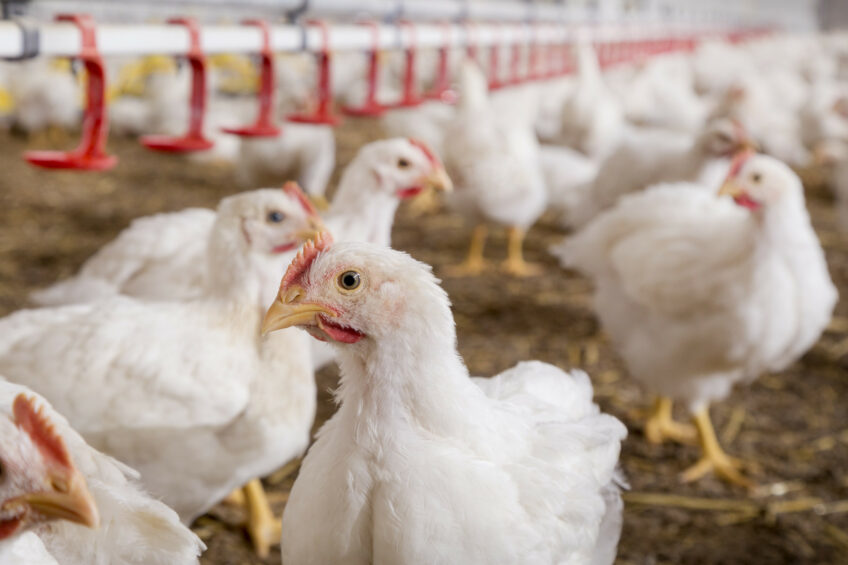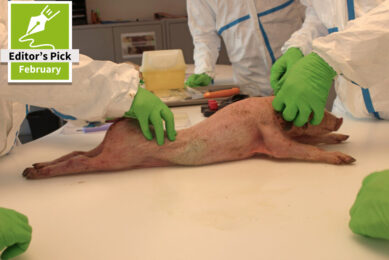Solving microbial instability: A gut approach

In the early stages of an animal’s life, unstable microbiota in the GIT can create stress, compromising gut health and performance. Imbalance in the microbiome and an insufficient level of beneficial microbes can threaten animals’ enteric health, keeping them from reaching their genetic potential. Studies show a strong link between production performance and gut health, with improved intestinal morphology, immune response, and gut barrier function leading to better animal performance.
WORLD OF MICROBES SPECIAL 2024 – read all articles
Inspired by these findings, scientists developed Selko Presan, a blend of specific organic acids, free-and slow-release medium-chain-fatty acids (MCFA), a phenolic compound, and target-release butyrates. The blend is formulated to support a more stable and diverse microbiota in swine and poultry, even in challenged conditions. By bolstering the balance and diversity of bacteria in the gut, the blend helps make animals more resistant to developing an imbalance of bacteria during production stress.
Managing the balance in the gut
Trouw Nutrition scientists conduct studies at global research centres and on commercial farms to validate how nutrition affects the health and performance of various species. Below we look at several swine and poultry studies conducted around the globe to understand how precision nutrition can help animals manage production stress.
Poultry gut studies
A research trial involving 776 broilers in Spain evaluated 2 diets fed for 21 days. The diets included a control diet, and that diet supplemented with Selko Presan-FY. No antimicrobial growth promoters were added to either diet. Both diets included carboxymethylcellulose (CMC) to add pressure to the digestive processes in the intestine by stimulating microbial overgrowth in the small intestine. Birds were raised in conditions mimicking those in a commercial setting and were assessed for microbiota balance in the jejunum and caecum. Digesta was collected on day 21 and checked for total microbial population, change in microbial population, and the total number of microbial genera present.
Figure 1 – Pyrosequencing the microbial communities found in birds highlights the difference in intestinal flora.

Total bacterial count in the jejunum was lower in birds on the supplemented diet compared to those in the control group. Because this situation results in lower consumption of nutrients by the microbiome, more nutrients are available for the host. Supplemented birds also demonstrated a higher diversity of microbial species in the small intestine and a reduction of E. coli in the caecum. Pyrosequencing showed that microbial diversity was 22% higher in the jejunum of birds eating the supplemented feed (Figure 1). More microbial diversity indicates a balance among types of bacterial genera rather than an overgrowth of just a few types of bacteria, with higher risk of pathogen overgrowth.
Trial takeaway: Results suggest that the addition of the blended feed additive may stabilise gut microbiota, supporting improved digestion, faecal consistency, and, ultimately, better performance.
Another feeding trial explored differences in 2 types of the medium-chain fatty acid C12 in the lower part of the GIT. The study sought to understand how the use of a slow-release form of the fatty acid compared to a free version with regards to influencing the concentration of C12 and/or if either could stabilise the microbiota in the lower portion of the small intestine.
In the trial, 936 chicks received 1 of 3 diets. The diets included a control diet, that feed with added C12 or the control diet with slow-release C12. Following the feeding period, bird intestinal samples were collected and checked for C12 content and the amount of Clostridium perfringens found in the small intestine. Overall, birds receiving the slow-release supplement had more C12 in the jejunum and ileum. However, a numerically larger amount of C12 was found in the duodenum of birds on the diet supplemented with free C12. Birds receiving the control diet and the diet with free C12 showed similar amounts of C. perfringens in the jejunum, while those on the slow-release diet tended to have a reduced count in the jejunum.
Trial takeaway: Findings demonstrate how the use of this slow-release form of C12 stabilises the microbiota and improves the microbial balance in the lower part of the small intestine.
Figure 2 – Supplementing stressed piglets with a blended, slow-release form of C12 can improve intestinal stability and increase the number of bacterial species found in the small intestine.

Piglet gut studies
Two research trials were conducted to see if supplementing challenged piglets with the multi-component feed additive Selko Presan-FX could stabilise the gut microbiota and protect bacterial diversity (Figure 2).
In the first trial, 18 piglets were given 1 of 2 diets – a control feed and that diet with a feed additive. Piglets also were challenged with an inoculation of an E. coli suspension. Samples from the jejunum and ileum were collected and checked for change in microbial population and microbial diversity. Piglets receiving the supplemented diet showed a greater richness of microbial species, more phylogenetic diversity, and improved distribution of microbial species in relation to total population in the jejunum and ileum compared to control group piglets.
In a second trial, a control feed or that feed supplemented with a blended feed additive was provided to 96 piglets for 35 days post weaning. All piglets were exposed to poor facility hygiene as a health challenge. Digesta samples from the jejunum and ileum were collected to examine microbial populations.
The assessment of jejunal digesta indicated that piglets receiving the supplemented feed had reduced numbers of some pathogenic bacteria compared to animals in the control group. Supplemented piglets also had 20% higher diversity in the bacteria found in the jejunum indicating a more stable gut microbiome.
Takeaways from trials: Both trials indicated that proactively supporting piglet gut health with a multi-component feed additive can help piglets weather production stressors like weaning and disease challenges while retaining microbial diversity in the small intestine.
Stress is a recognised part of production, whether it stems from weaning, disease, or stocking density. It has been linked to loss of microbial diversity in the intestinal tract, overgrowth by pathogenic bacteria, and reduced gut health. Supporting animals with blended feed additives that include free- and slow-release MCFAs combined with a phenolic compound and target release butyrates can help stabilise and maintain the diversity of the microbial population in the gut. Stable bacterial populations reduce opportunities for pathogenic bacteria to outcompete beneficial bacteria and negatively affect gut wall integrity before they can be used by the animal. Improved gut health supports nutritional absorption and more uniform production while helping reduce the need to rely on antibiotic use.







